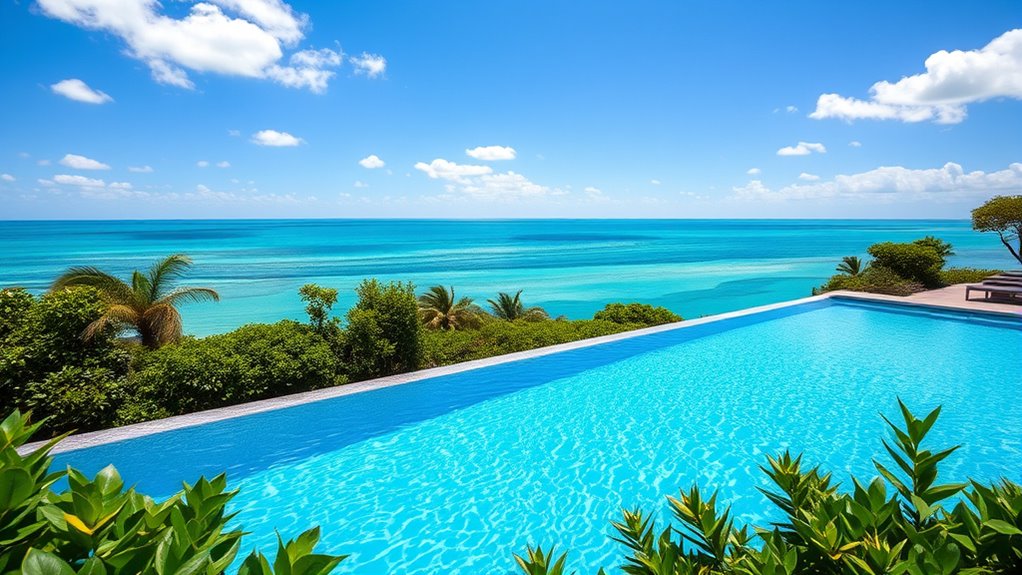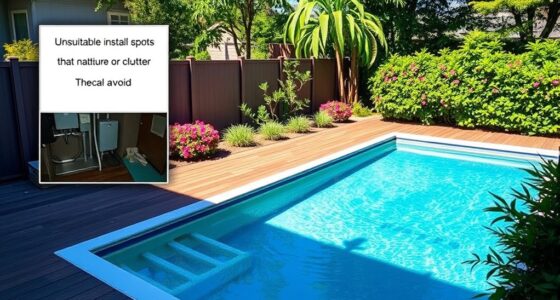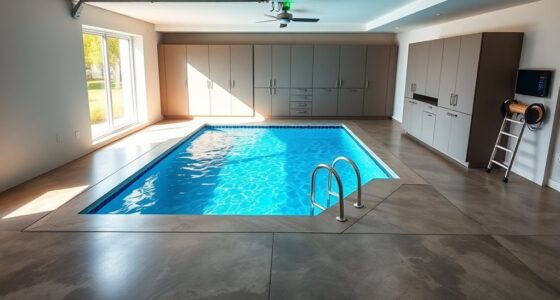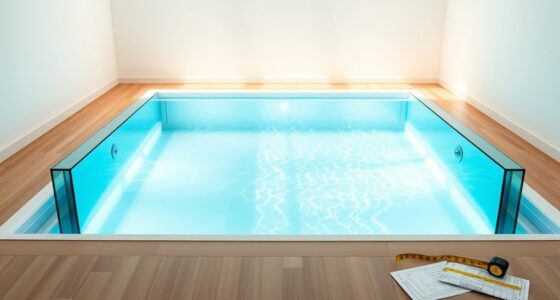Choosing between saltwater and chlorine for your endless pool depends on your maintenance preferences, budget, and comfort. Saltwater systems generate chlorine automatically, are easier to care for, and cause less skin and eye irritation, but they cost more upfront. Chlorine pools are cheaper initially but require frequent chemical handling and upkeep. To make the best choice for your lifestyle and long-term needs, explore the details ahead.
Key Takeaways
- Saltwater systems offer lower maintenance, gentler water, and consistent chlorine levels, making them more user-friendly for endless pools.
- Chlorine pools have lower initial costs but require more frequent chemical handling and testing over time.
- Saltwater pools tend to be more energy-efficient, better at heat retention, and environmentally friendly.
- Traditional chlorine pools may cause more skin and eye irritation but allow precise control over chlorine levels.
- Consider upfront costs, ongoing maintenance, and personal comfort preferences when choosing the best system for your endless pool.
Understanding How Saltwater and Chlorine Systems Work
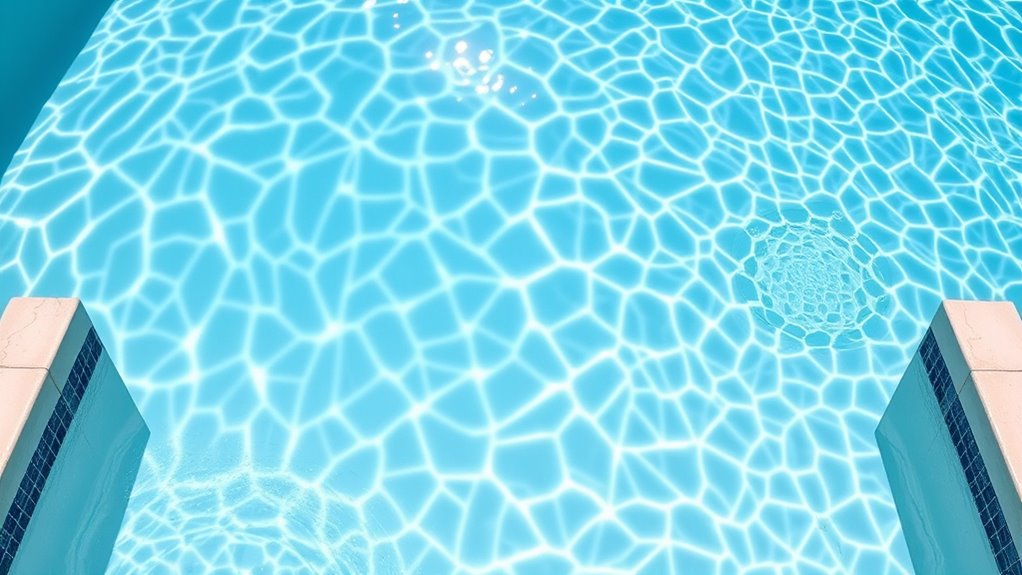
Saltwater and chlorine systems both serve the purpose of sanitizing your pool, but they do so in different ways. With a saltwater system, you add salt to the pool, and a salt chlorine generator converts that salt into chlorine through electrolysis. This process produces a steady, low level of chlorine, which keeps the water sanitized without manual dosing. Chlorine systems, on the other hand, involve adding chlorine directly in various forms—liquid, tablets, or powder—either manually or through automatic feeders. This method delivers an immediate dose of chlorine to kill bacteria and algae. Saltwater systems tend to produce a more consistent chlorination level, while chlorine systems provide quick control over chemical levels. Both methods rely on chlorine’s disinfecting power but generate it in different ways. Recognizing patterns in angel numbers can help pool owners tune into subtle signs about their water chemistry and maintenance routines.
Cost Comparison: Initial Investment and Long-Term Expenses
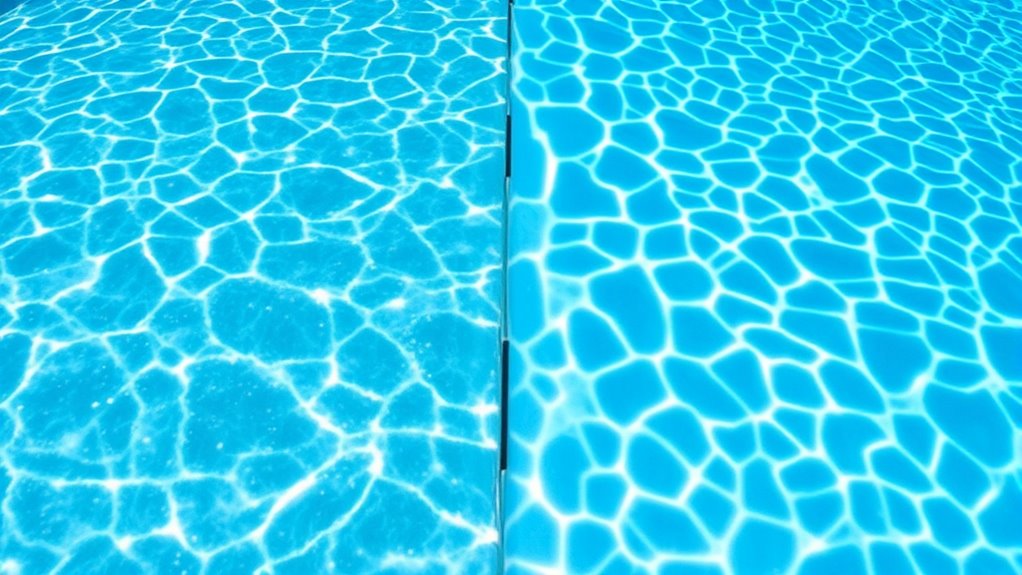
When comparing saltwater and chlorine systems, your initial purchase cost can vary considerably. You’ll also want to take into account ongoing expenses like maintenance and energy use, which impact your long-term budget. Understanding these costs helps you choose the system that fits your financial plan best.
Upfront Purchase Cost
Starting with the initial investment, saltwater systems typically have a higher upfront cost than chlorine pools because they require a specialized salt chlorinator and sometimes additional equipment like a salt delivery system or upgraded filtration. These components can considerably increase your initial expenses. In contrast, a traditional chlorine pool usually costs less upfront since you primarily need standard chlorine feeders or tablets, which are more affordable. If you’re on a tight budget, the initial purchase of a chlorinated pool may seem more appealing. However, keep in mind that the initial cost isn’t the only factor. Saltwater systems often offer long-term savings and convenience, but the upfront investment is definitely higher. Considering cost comparison can help you evaluate the overall value and make an informed decision.
Maintenance and Operating Expenses
Although saltwater systems often have higher initial costs, they tend to be more economical in the long run because they require less frequent chemical adjustments and fewer replacements. With saltwater pools, you’ll spend less on chlorine and chemical balancing over time, reducing ongoing expenses. The maintenance mainly involves monitoring salt levels and cleaning the cell, which doesn’t need to be done as often as chemical additions for traditional chlorine pools. Chlorine pools, on the other hand, demand regular chemical purchases, testing, and adjustments, increasing your monthly costs. Additionally, chlorine pools often require more frequent equipment replacements due to chemical wear. Overall, while the upfront investment is higher with saltwater, your ongoing expenses are typically lower, making it a more cost-effective choice for long-term pool ownership. Proper maintenance is essential to keep your pool functioning efficiently and extend the lifespan of its components.
Maintenance Requirements and Ease of Use
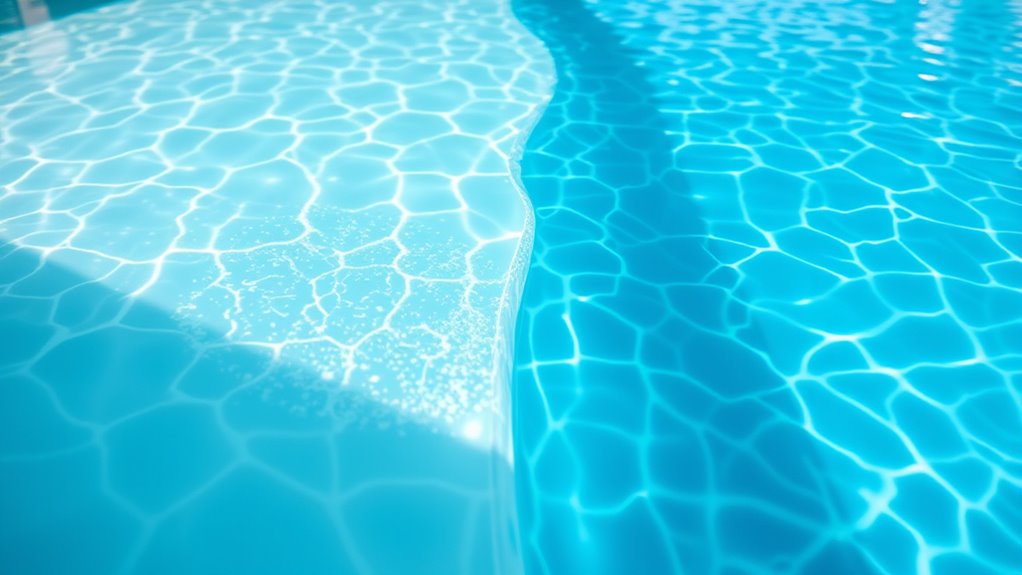
Saltwater systems generally require less maintenance than traditional chlorine pools, making them easier for homeowners to manage. With a saltwater system, you don’t need to handle regular chlorine refills, and the system automatically produces chlorine as needed. This reduces the frequency of chemical additions and minimizes handling of harsh substances. You’ll mainly need to monitor salt levels and occasionally clean the salt cell to prevent buildup. In contrast, chlorine pools require you to manually add chlorine regularly, test water chemistry often, and balance pH levels to keep the water safe. Saltwater pools also tend to have fewer issues with algae and bacteria, which simplifies overall upkeep. Overall, saltwater pools offer a more straightforward, less labor-intensive experience for pool owners.
Impact on Skin, Eyes, and Overall Comfort
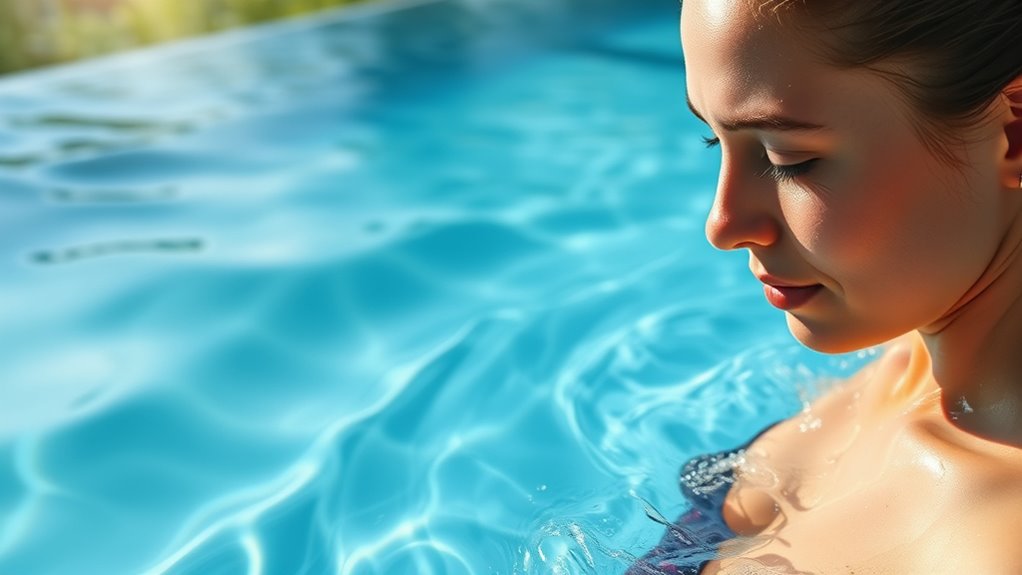
Because saltwater pools generate chlorine more gradually and maintain more stable chemical levels, they often lead to a gentler experience for your skin and eyes. You’ll likely notice less irritation and dryness compared to traditional chlorine pools. Saltwater systems produce chlorine at lower concentrations, which reduces the harshness that can cause redness or itching. Your eyes will feel less stinging, making swimming more comfortable, especially if you swim frequently or have sensitive skin. Overall, saltwater pools tend to feel softer and less abrasive, creating a more pleasant environment. This gentler balance helps prevent common discomforts associated with chlorinated pools, allowing you to enjoy longer, more relaxing swims without the distraction of irritation or discomfort. Additionally, the development of AI safety measures in the industry ensures that emerging technologies are managed responsibly to protect user well-being.
Environmental Considerations and Eco-Friendliness
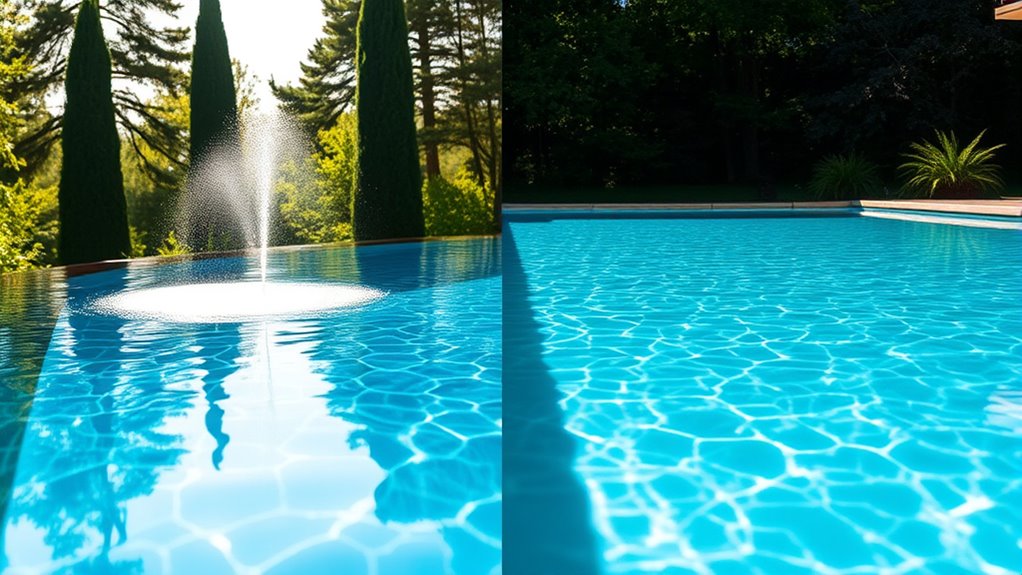
You should consider how saltwater and chlorine pools affect the environment, especially regarding chemical runoff and ecosystems. Saltwater pools often use less energy overall, but their maintenance still impacts sustainability. Additionally, the safety features of heated mattress pads demonstrate how modern technology can promote safer, more eco-friendly usage. Understanding these factors helps you choose a pool that aligns with eco-friendly practices.
Chemical Impact on Ecosystems
While both saltwater and chlorine pools have environmental impacts, saltwater systems generally pose fewer risks to ecosystems. Chlorine pools can release harmful chemicals if not properly managed, potentially contaminating nearby water sources and harming aquatic life. Chlorine byproducts, such as chloramines and dioxins, can persist in the environment and affect wildlife. In contrast, saltwater pools produce a steady, low level of sodium and chloride ions, which are less toxic and more naturally occurring. However, excess salt can still runoff into local waterways, impacting freshwater ecosystems. Proper maintenance and responsible disposal are essential for both systems. Additionally, implementing vertical storage solutions can help pool owners organize and manage chemicals safely, minimizing environmental risks. Overall, saltwater pools tend to have a smaller chemical footprint, making them a more eco-friendly choice for environmentally conscious pool owners.
Energy Consumption Differences
When comparing the energy consumption of saltwater and chlorine pools, saltwater systems often prove to be more energy-efficient overall. They typically require less power for sanitation, reducing your energy bills and environmental impact. Consider these points:
- Saltwater generators operate continuously but use less energy than traditional chlorination systems.
- Chlorine pools rely on mechanical chlorinators and heaters, increasing energy use.
- Saltwater systems often need fewer chemical treatments, saving energy on chemical production.
- Maintaining ideal water temperature in saltwater pools generally consumes less energy, as they tend to hold heat better.
- Additionally, corrosion resistance in saltwater pools can lead to reduced maintenance and energy costs over time.
Sustainability of Maintenance
Saltwater pools generally offer a more environmentally friendly maintenance approach compared to traditional chlorine pools. They reduce the need for chemical manufacturing and transportation, lowering your carbon footprint. Salt systems generate chlorine on-site, minimizing chemical waste and packaging waste associated with bottled chlorine. Additionally, saltwater pools tend to require fewer chemical adjustments, which means less runoff into the environment. This eco-friendliness extends to your energy use as well, since salt systems often operate more efficiently and with less chemical handling. Over time, maintaining a saltwater pool can lead to less chemical waste, lower environmental impact, and a healthier aquatic ecosystem. Incorporating eco-friendly maintenance practices can further enhance the sustainability of your saltwater pool. If sustainability matters to you, choosing a saltwater system aligns well with eco-conscious pool ownership.
Safety and Handling of Pool Chemicals
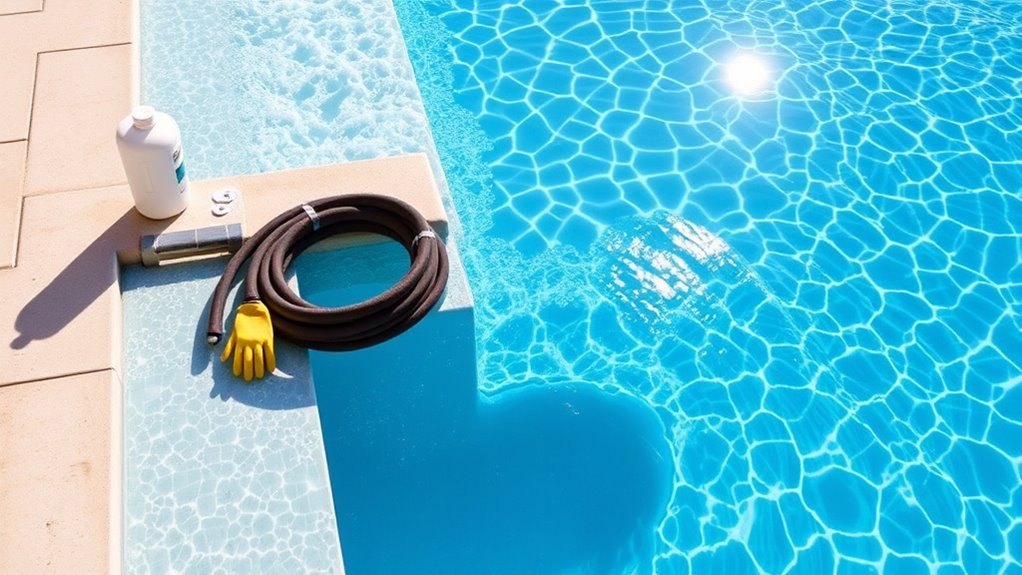
Handling pool chemicals safely is essential to prevent accidents and guarantee a healthy swimming environment. Always read labels carefully, follow manufacturer instructions, and store chemicals in a cool, dry, well-ventilated area away from children and pets. To guarantee safe handling, keep these tips in mind:
Always follow safety tips: read labels, store properly, and handle chemicals with care.
- Wear protective gear like gloves and goggles when mixing chemicals.
- Never mix different chemicals; it can cause dangerous reactions.
- Add chemicals to water slowly, never the other way around.
- Use dedicated tools and containers to avoid contamination.
- Be aware of forsale 100, which can influence chemical availability and pricing.
Making the Right Choice for Your Lifestyle and Budget
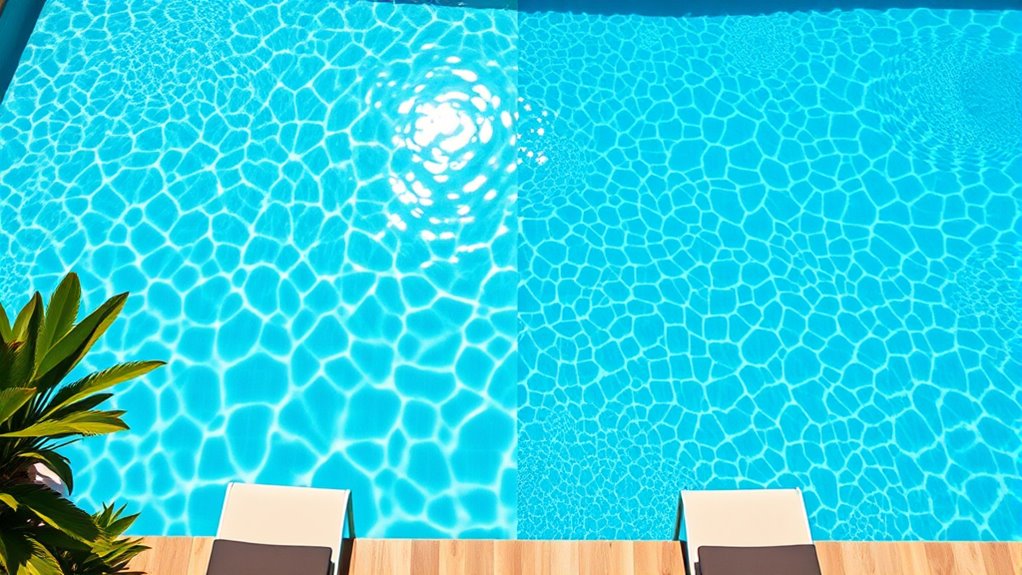
Choosing the right pool system depends on your lifestyle and budget. If you want low maintenance and minimal chemical handling, a saltwater system might be ideal, though it often costs more upfront. It’s perfect if you prefer softer water and fewer chlorine smells. On the other hand, traditional chlorine pools usually have lower initial costs and are easier to install, making them suitable if you’re on a tight budget. Consider how much time you want to spend on chemical adjustments and cleaning. Saltwater pools may save you effort long-term but come with higher installation expenses. Think about your long-term financial plan and daily routine. Additionally, understanding the cost‑of‑ownership helps you compare ongoing expenses between systems. Ultimately, selecting between saltwater and chlorine depends on balancing your comfort preferences, maintenance willingness, and budget constraints.
Frequently Asked Questions
How Long Does It Take to Install Each Type of System?
It typically takes about 1 to 2 days to install a saltwater system, depending on your pool size and existing setup. Chlorine systems, like cartridge or tablet feeders, usually install within a few hours since they’re simpler. You’ll want to factor in time for plumbing, wiring, and testing. Overall, saltwater systems may take a bit longer, but both are manageable with professional help to guarantee proper setup and safety.
Can I Convert My Existing Pool From Chlorine to Saltwater?
Yes, you can convert your existing pool from chlorine to saltwater. Think of it like switching from regular coffee to a premium blend—you just need the right equipment. You’ll install a salt chlorinator, adjust your pool’s chemistry, and let the system do the work. The process typically takes a few days, but it’s straightforward and worth it for softer, more natural-feeling water that’s easier on your skin and eyes.
Are There Any Health Risks Associated With Saltwater Pools?
Yes, there are some health risks associated with saltwater pools. You might experience skin or eye irritation if the salinity levels are too high or if the chlorine levels aren’t properly maintained. Some people with sensitive skin or allergies could find saltwater pools uncomfortable. Additionally, if salt levels aren’t correctly managed, it can cause corrosion to pool equipment or irritate your respiratory system. Regular maintenance helps minimize these risks.
How Do Saltwater and Chlorine Pools Affect Pool Equipment Longevity?
Saltwater and chlorine pools are like two different engines, each affecting your equipment uniquely. Saltwater pools tend to be gentler, reducing corrosion and extending equipment lifespan. Chlorine pools, while effective at sanitizing, can cause more wear and tear over time. With proper maintenance, both types can last long, but saltwater pools generally require less frequent repairs, helping you save money and keep your pool running smoothly.
Which System Is Better for Outdoor Versus Indoor Pools?
For outdoor pools, saltwater systems are usually better because they’re more resistant to outdoor elements and require less maintenance. They also produce gentler chlorine, which is easier on your eyes and skin. For indoor pools, chlorine systems might be preferable since they can better control odors and humidity levels indoors. Ultimately, consider your environment and maintenance preferences to choose the system that suits your pool best.
Conclusion
Choosing between saltwater and chlorine pools means weighing convenience against cost. Imagine the soothing, gentle water of a saltwater system versus the familiar, crisp feel of chlorine—each offers a different experience. While saltwater may be more eco-friendly and easier on your skin, it often comes with a higher upfront price. Ultimately, your decision depends on your lifestyle and budget, but either way, you’re creating a personal oasis to enjoy for years to come.

